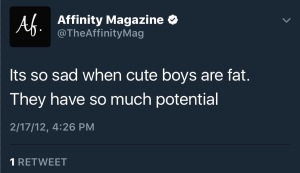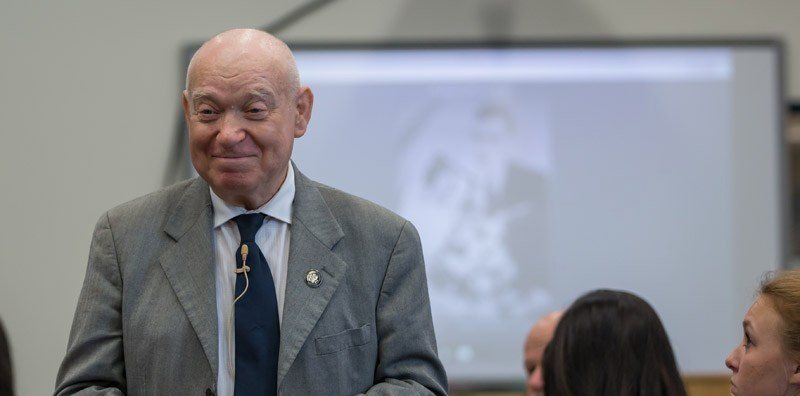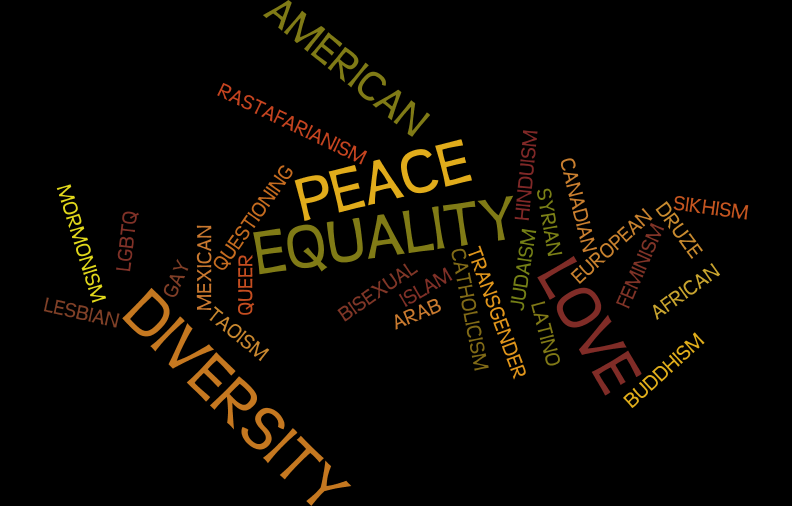We are living in turbulent times. Over the past year, it has become increasingly clear that we are a divided country. Hate crimes and antisemitism are on the rise and unfortunately, white nationalist and racist groups feel emboldened and supported to speak out publicly. This is only exacerbated with the ability to express these views through social media, in the comfort of your own home, without having to see the people you are harming face to face. This is a dangerous road to go down as it starts to normalize these thoughts, beliefs and actions. This can never be accepted or normalized. The only way to maintain our way of life and our democracy is through mutual respect, the free and open exchange of ideas based in fact and mutual respect. We need to acknowledge where we disagree and identify areas where we agree and can come together. Sadly, not all forums that promote themselves as a forum for free expression or open-mindedness have proven through their actions to fulfill this promise.
Living in the digital age, as we do today, you have to be careful about what you say, post, search and re-post on social media. When we are young, naive and/or impulsive, we have to remember that the things we write and post, on sites like Facebook, Instagram and Twitter, that at times give us a false sense of anonymity, never go away. They reach real people, and when we least expect it, can come back to haunt you, at times with devastating consequences.
To help job-seekers better understand the role of social media in their job search, CareerBuilder.com conducted a survey in 2016 that asked hiring managers and human resource professionals how, and why they incorporate social media into their hiring process. Their survey found that 60% of employers use social networks to screen potential job candidates, up from 52% last year and 11% in 2006. With 49% of those hiring reporting that information found online had a negative impact on their hiring decision.
Our online persona does not only have an effect on hiring decisions, but according to the same survey, more than a quarter of employers found information online that caused them to reprimand or fire an employee. As one of the 89% of job-seekers on social media or, or one of those already employed, you will want to make sure that you are careful online. Rosemary Haefner, the vice president of human resources at Career Builder says:
Social media is a primary vehicle of communication today, and because much of that communication is public, it’s no surprise some recruiters and hiring managers are tuning in.
This, of course, does not only apply to those looking and applying for jobs. This could affect anybody. It has been widely reported that a review of social media is frequently completed by College admissions boards as part of the admissions process. We have heard countless news stories of the chaos created over the Presidents infamous tweets. Now, several days ago this hit much closer to home.
Just days ago, several insensitive tweets resurfaced from the founder and Editor-in-Chief of Affinity Magazine. These were tweets she had posted (+/-) 5 years ago. She had been my past employer, when I was a writer and Political Editor at Affinity Magazine. I previously parted ways with the magazine due to differing opinions and discrimination I suffered during my tenure. It was made clear that my articles would not be published as they were in opposition with the beliefs of the Editor-in-Chief, nor would she allow me to publish them anywhere else, despite this being part of the magazine policy. When I learned of her behavior and her tweets, I was saddened by the horrific comments, ashamed to have been connected to the impertinent things she said, but unfortunately was not surprised.




I, personally, was disheartened to see these sort of awful things from a magazine that brands itself as “the first social justice platform that directly caters to teens, while also addressing many significant issues that are often overlooked.” It is devastating to read some of the offensive and hurtful old tweets that have resurfaced at a time when we are in great need of a social justice magazine that accepts all races, cultures, nationalities, religions, genders, sexual orientations, and points of view. The last thing we need is to perpetuate division and hatred. A place where all can be accepted, share information and exchange ideas based in fact and mutual respect is what we so desperately need.
Having friends who are going through issues of uncertainty related to gender identity, coupled with the recent policy changes making it more difficult for transgender people, and the fact that Affinity Magazine attempts to cater to this community, having an LGBT+ category on their website. The tweet defaming the LGBT+ community is particularly repulsive and ironic.

I was surprised to see how she went after just about every minority or group of people different from herself in these abhorrent tweets.
Using derogatory slurs and stereotypes, there were rude tweets about Asians.


Amongst this mess, there were insulting tweets about Mexicans, calling them poor, illegal, and “durty,” and




hurtful tweets about over weight people, body-shaming and using demeaning words to describe them with disdain.



As one who was silenced when I tried to publish an article defending my Jewish identity, some of the most hurtful comments to me were the anti-Semitic tweets.


I am not sharing these tweets to promote her horrific words, or with the goal of blaming the entire staff. I must state, that it does not appear that the views expressed in these tweets represent those of the writers as a whole, nor was it my personal experience while working there. These appear to be the thoughts and beliefs of the individual or individuals who wrote them. Unfortunately, the writer(s) of the tweets were the one(s) who were in control and yielded power over the publication. As one who worked at Affinity, these tweets never represented my views, and I feel sorry for those who were working for a magazine where there is now such scrutiny when they may have had no involvement in the horrible things that were said.
Late in the day, on the third of March, the editor-in-chief of Affinity Magazine, Evelyn A. Woodsen (AKA Evelyn Atieno & Evelyn V. Woodsen), released a public statement on Twitter concerning the crude tweets:
Many old tweets have come to light recently. I understand the outrage and I am very sorry and sickened by the tweets I made when I was around the age of 14. Age is no excuse at all. I was not educated at the time about many issues in the world, and that’s what inspired me to start Affinity. I turned my old personal Twitter to the Affinity Twitter. Since then, I have done community work advocating for both men and women. Those old tweets don’t reflect the person I am now, Affinity, or Affinity’s writers. They were disgusting and I am. They were from over 6 years ago. Life is about learning from the past and working to better yourself. I have bettered myself and that’s shown through all of the work I have done now. I hope you all forgive my immaturity that I displayed when I was younger. I am ashamed of the person I was, but I assure you that’s not who I am anymore. Affinity was started so I could better myself and learn about the word [sic] and not be as ignorant as I was before. Thank you.
Personally, I believe that this apology does not duly address the countless offensive things said. I believe that, though she claimed age was no excuse, there was no reason to mention her age unless it was to help vindicate her actions. While she may have evolved in some of her views, it is clear through her continued actions and behaviors that her disdain for those different from her or with opposing views remains firmly in place. I would love to believe that she is genuinely regretful and apologetic, but based on her behavior—such as laughing at her anti-Semitic comments only three hours after her public statement, her repetitive stifling of ideas with which she does not agree, and dismissing those writer from the magazine for made up reasons—it is impossible to believe that she feels badly about anything other than getting caught.


The day after the discriminatory tweets were exposed, two articles were published about the “tweets” published and Affinity Magazine in an attempt to save the publication and resurrect their reputation. One article was written by a new member of their staff. The second article was by Evelyn.
The article by the new staff member of the Affinity team, describes his first couple days at Affinity, and why he believes the writers at Affinity should not be judged for any of the tweets. I understand that sentiment: and for the most part agree that the writers are not responsible for what was said and therefore should not be blamed. I have sympathy for them, having to answer for things over which they had no control.
Evelyn Atieno does not represent us, and her tweets do not represent the values that we hold on the Affinity Team.
Moving on to Evelyn’s article, she began by describing her goals when she started Affinity magazine.
My goal for this magazine was for it to be a platform for other teens, not just myself.
She goes on to explain how being raised in a conservative town influenced the way she saw the world. She said she believes that her recognition of her past mistakes shows character development and how much she has changed. She discussed her activism and how much she gives back to her community.
The day after those two articles were published, one more article was published about the good things that Affinity Magazine has to offer.
Affinity is a new wave of journalism that has given a voice to teenagers.
This article talks about how Affinity is a group of writers with many different views, and therefore, they believe you should not generalize things written by one person to the views of another. She talks about how Affinity gives teens a place to be heard would not have one otherwise.
Sites like Affinity offer a voice to people who otherwise would not have one.
She talks about the need for a free press and other points of view. She says its okay to disagree, but not to insult or demean somebody because of it.
A democracy cannot exist without free press. The news needs to exist even if you disagree with the way it is presented. This is why we must stop demeaning our journalists, even amateur ones like on Affinity. It is okay to disagree, but it is not okay to insult or demean someone simply because you don’t like their opinions.
All of the quotes from this article make great points and in theory are true. We are in great need of a free press and a place for teens to express their thoughts and views free from anger and judgment. This free exchange of thoughts and ideas needs to be based in fact and done with respect. This is how we learn, grow and come together as a society. This helps us educate ourselves on all aspects of an issue, find areas of agreement and ways we can work together for the betterment of society. This is democracy in action. Unfortunately, all of this is in direct contradiction to the culture and policy at Affinity Magazine and my experience while working there. In fact, these quotes—about the need for a free press and how Affinity is full of people with different points of view, and gives everybody a voice—directly contradict the explanations I was given on why I could not publish my article and why I had to leave the magazine.
It is disheartening to see this publication try and highlight an image of all the best qualities of their publication, yet, the image they are presenting is not based in reality and, to be frank, are utterly false. There is an old saying I have heard many times: when people show you who they are, believe them. This is the case here: when Evelyn thought no one was looking, she apparently felt free to be “herself.” She never gave it a second thought that she was doing this in the public forum of social media. Tweet after tweet, she showed us who she is. We must believe her. Affinity Magazine is sadly just an extension of the closed minded, prejudice that is so prevalent in our society. It is not the platform of social justice it claims and is so badly needed for teens today.
Please contact me if any of the facts are wrong. I simply presented the facts as they were laid out before me.






















